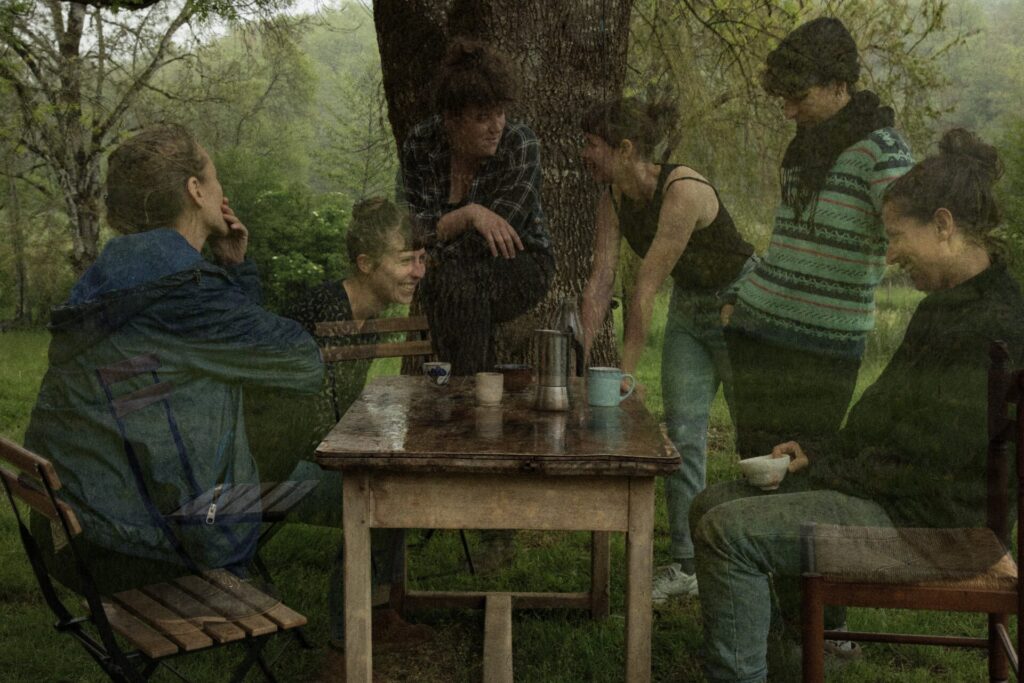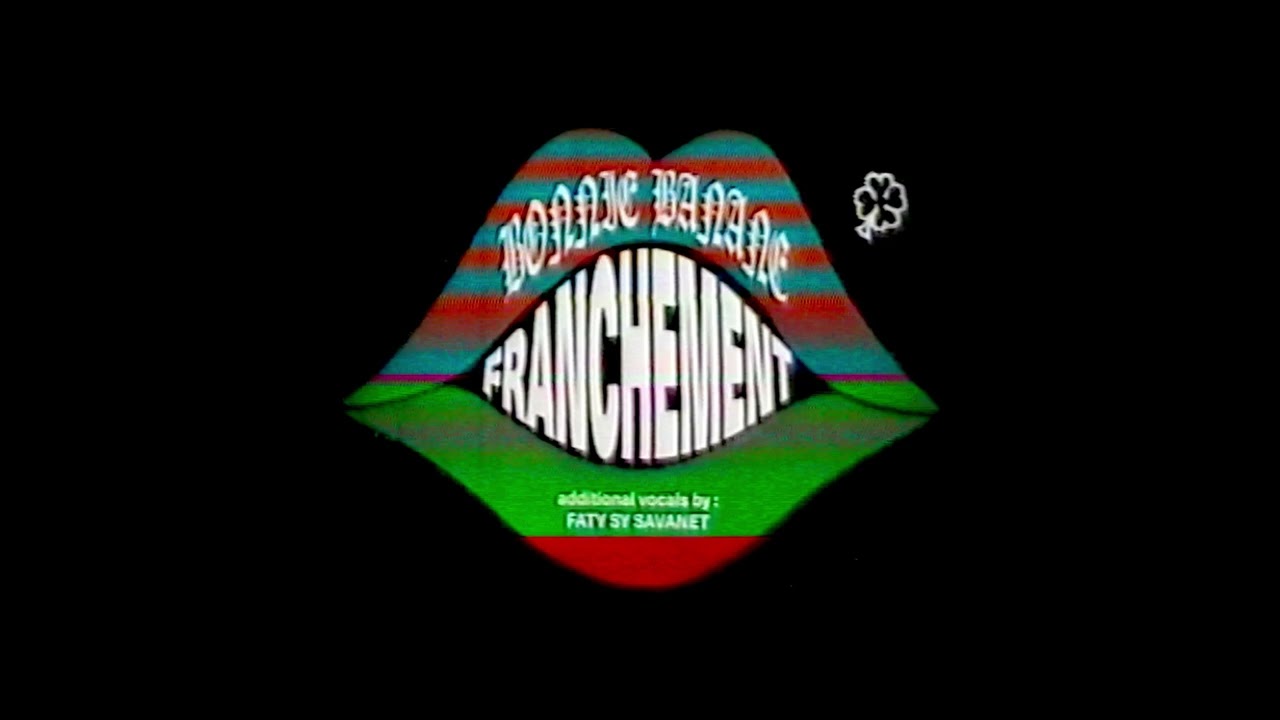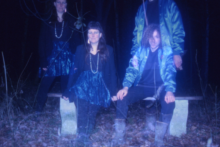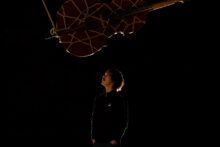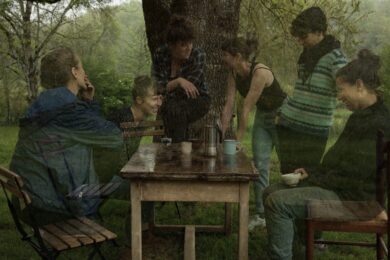There have been signs in the past few months that France’s hitherto-marginal alternative folk or ‘trad’ scene has been gaining in visibility. The first edition of the New Trad Fest in May, co-organised by collective La Berge, cultural association Médiator and the Zamzamrec label (run by Franco-Italian couple Heloïse Thibault and Olmo Guadagnoli, who release music under their own names and as Zohastre), was a four-day event combining performances from drone-folk titans France, La Nòvia’s Jéricho, Cromorne (from the Dijon-based Collectif Engeance), readings, screenings – including an airing for Laetitia Carton’s 2018 film Le Grand Bal which documents an annual, seven-day ‘bal’ (a folk dance or ‘ball’) that takes pace every year in the village of Gennetines in the Allier department of France – and dance sessions. One of the fascinating features of the scene is how crucial these ‘bals’ are as an alternative to a standard concert format, with groups frequently engaging in both modes; for a ‘bal’, dancing is not only encouraged but is intrinsic to the experience, placing musicians and the public on a more equal footing, each responding to the other as, collectively, they drive the energy and spontaneity.
The ‘bal’ (a broad category, incidentally, which includes folk balls) has always harked back to a pre-concert hall kind of musical experience; more recently, rave/club culture have perhaps performed similar functions without relying on the presence of musicians. Folk ‘bals’ were present in previous eras when folk revival has been at its most conspicuous (between the wars, in the 70s) and they have continued to take place since. The current generation, however, appear to be reshaping the ‘bal’ in much the same way as they’ve reimagined the sound of French folk, and engaging in discussions – such as those that took place over two days at the Cité de la Musique (part of the Philharmonie de Paris complex in north-east Paris) at the beginning of May as part of the Le Printemps du bal weekend – that take in contemporary gender politics, the creation of safe spaces and experimental approaches to the ‘bal’ format itself.
I got the feeling that Le Printemps du bal-which also featured an experimental ‘bal’ and performances from an incredible line-up of artists including Jacques Puech, Sourdurent, Erwan Keravec, Cocanha, Perrine Bourrel, Romain Baudoin, Julien Achary, Bòsc and Emmanuelle Parrenin, all accompanied by live visuals from La Blogothèque’s Vincent Moon – was also an opportunity for the scene to take stock of itself. ‘Trad’ music was, perhaps for the first time, being welcomed into what hurdy-gurdy player Romain Baudoin described as the “temple” – that is, Cité de la Musique and La Philharmonie, physical expressions of an institutional culture that has previously ignored or derided ‘popular’ or folk forms. The validation was welcomed, albeit warily at times. Élisa Trebouville (Bourrasque, Bòsc, Sourdurent) best articulated the contradiction, expressing both gratitude for the acknowledgement, “not just for ourselves but for everyone who is doing what we do” and a commitment to remaining independent, small-scale and in opposition to the domination of France’s official culture.
Bòsc are reviewed below, alongside just a few of the best albums from the last few months. As ever, I’m pained by the number of fabulous releases that I don’t have space to review but I’ve got put tracks from some in the latest mix: Oberland, Dargent, Elieh and Halal’s tangy SIHR project; Gilles Poizat’s oblique electro pop; hip hop fusion courtesy of M A R and Ghost In The Tapes; TH, one of the most intriguing new voices in France rap, in the company of one of the country’s finest MCs, Alpha Wann; Camoufleur’s 50s jazz-and-chanson-tinged post-rock; crunchy DIY electronics from Or Or; Mélodie Blaison’s lush ambient compositions; oddball chanson from Marie Klock and Porta’s bucolic surrealism.
BòscBòscLa Crue / La Grande Folie
At this year’s Acid Horse festival, co-organised by tQ’s John Doran, I got chatting to genial Canadian artist Eric Chenaux about, among other things, the French folk scene; Chenaux is based in Corrèze, in south-central France, has made a French folk album with Éloïse Decazes and recorded former Cocanha member Maud Herrera aka Tal Coal). In particular, we spoke a lot about Bòsc. It turns out we’re both obsessed with ‘L’Èrba d’Amor’ which, when I first heard it as part of Bòsc’s set for the Printemps du bal, made me feel like I was levitating. Ok, so I was coming down with something and starting to feel feverish, but its power undoubtedly translates to the recorded version on the group’s self-titled debut: the mesmerising vocals in Occitan, the wavering drones, the heart-stopping first chord change at 4 minutes and 48 seconds, the feeling of wanting it to last for an eternity. I don’t think they’d appreciate me focusing on just the one song, though, and with good reason – Bòsc is an all-round beauty. Bòsc have emerged from La Crue, an all-female collective that provides something of a counterbalance to the predominantly male La Nòvia. Marthe Tourret and Elisa Trebouville, who perform as a duo, Bourrasque, or as a trio, Boursec, with La Nòvia’s Jacques Puech, are joined here by three more singer-instrumentalists: Lisà Langlois-Garrigue, Mathilde Spini and Noëllie Nioulou. Their material is based on songs of the Massif Central region, and is usually sourced from online archives. There are ‘complaintes’ (sad ballads, essentially, the term has been used in English too) and dance tunes like ‘Bourrées à Vermerie’, all performed in a style that has some of the coarse-textured and hypnotic quality of the La Nòvia groups but which also allows for more sweetness and lyricism. L’Èrba d’Amor’ aside, Bòsc features many more stunning moments, like the wailing wall of strings that is erected during ‘Al Bòsc d’Anglars’ and the conclusion of ‘Aval Aval’ wherein all five vocalists (I think) circle each other, briefly synchronise, then scatter again like birds on the wing.
Marion Cousin, Elöise DecazesCom A Lanceta Na MãoPagans/Le Saule/La République Des Granges
Com a lanceta na mãois the latest album in Marion Cousin’s series re-envisioning the traditional music of Spain and Portugal. Cousin’s affection for Iberia is genuine and long-standing, and has also seen her collaborate with Spanish artist Borja Flames as June Et Jim and, more recently, Catalina Matorral. This time her peregrination has taken her to the Tràs-os-Montes province in the northeast of Portugal, and she’s recruited Arlt’s Eloïse Decazes, a long-term friend, as a companion (on previous releases she’s worked with duo Kaumwald and cellist Gaspar Claus). As with the previous instalments, it’s an album of folk songs that barely feels like a folk album at all. For each new region and dialect, Cousin, with the help of her collaborators, concocts a new musical language that both suits and subverts the source material. Here, singing together and playing all the instruments (synths, guitars, concertina, piano, tapes and more) they invite you on a delightfully rocambolesque trip that take in off-beat, discordant keyboard lines, brittle machine beats and wildly pitch-shifted guitar. Apparently, the pair have often been told that they have similar singing styles and I must admit they’ve long been twinned in my mind. They use this closeness to their advantage here, singing in unison to create a hybrid Cousin-Decazes voice or circling each other, as they do to exquisite effect on ‘A Fonte Do Salguirinho’.
Cousin also released a solo album late last year. It slipped out into the world on Christmas Eve, which is maybe why it hasn’t had the attention it deserves. There are no folk songs on Mélancolie Mow, just Cousin originals, and they display yet another facet of her talent. It’s like Com a lanceta na mão’s sinister relation: here we have shadowy, and at times even slightly menacing, ballads (‘Love Love’ is less cosy than its title suggests), adorned with alternately warm and chilly synths and bolstered by Renaud Cousin’s sympathetic and subtly treated drums. Cousin also distorts her own voice, which is eerily delayed on ‘Le Lait’ or put through what sounds like a vocoder for the tense finale of ‘Mesdames’.
Colin JohncoCrabe GéantJohnkôôl Records
Colin Johnco, the co-founder of Johnkôôl Records, is hard to get a handle on, an electronic producer and DJ who also released and was the key collaborator on experimental folk musician Emmanuelle Parrenin’s magical 2022 album Targala, La Maison Qui N’En Est Pas Une. Parrenin returns the favour on the utterly mesmeric Crabe Géant, contributing hurdy-gurdy and “vocal matter” to ‘Ventre’. In fact, Crabe Géant features a thrilling cast of guest musicians, including producer and dancer NSDOS, sax player and Nurse With Wound-collaborator Quentin Rollet, producer Paulie Jan and more. The list of contributors appears to presage a wildly eclectic album; instead they all surrender to the same rich, flowing sound, with each of the long tracks (opener ‘L’Etoile’ is nearly 24 minutes long) combining almost seamlessly. I suppose the music here is in a space not dissimilar to that sometimes occupied by The Necks at their most nebulous, one where free jazz, ambient and minimalism commune, and where new layers – vibes from David Neerman or fine seams of electronic noise – gradually slide into place. Really, though, it’s as difficult to pin down as its author, warm and welcoming one moment, dark and dissonant the next. It’s certainly never placid; there are always shadows moving beneath the surface.
UTOWhen All You Want To Do Is Be The Fire Part Of FireInFiné
I’d been so used to advising French acts not to mention ‘trip hop’ in press materials aimed at the UK that it has been slightly bewildering to see it come back into favour, both as a sound and a descriptive. The term never fell out of favour in France the way it did here, where it was killed by its ubiquity, despised by its supposed pioneers (like Portishead’s Geoff Barrow), an over-stretched catch-all for downtempo pop from Sneaker Pimps, Morcheeba, Smoke City et al and listless remixes of indie acts from Manic Street Preachers to Garbage. Anyway, it’s back and I can safely say that the second album from UTO – the duo of Neysa May Barnett and Emile Larroche – features undeniable traces of This Is… Trip Hop trip hop (such as on ‘2 Moons’), but the 90s-sourcing is considerably broader – about half-way through, ‘Unshape’ turns into full-blown Big Beat and ‘Napkin’ revisits the ‘Think break’ (aka the “Wooh! Yeah!” break) that became ubiquitous in late 80s/early 90s hip house and pop house. What’s so lovely here is that these are just some of the materials employed in the service of a very personal, even eccentric, idea of post-Billie Eilish pop, one that also finds space for odd, squirty electronics and pockets of darkness as well as euphoria. Propulsive, ultra-catchy singles ‘Zombie’ and ‘Art & Life’ help to make When All You Want To Do Is Be The Fire Part Of The Fire one of the best French pop albums of the year.
Bonnie BananeNiniPéché Mignon
You could direct the same praise at Bonnie Banane’s Nini. Another the thing the two records have in common is the attention given to the inner workings of the female body. UTO’s ‘Plumbing’ seems to be concerned with the physical manifestations of desire, while Bonnie Banane’s ‘PMS’ is both frank and funny – especially the little voice in the background crying out “where my hormones at?”. This is BB’s second ‘proper’ album after 2020’s Sexy Planet and it’s even more of a riot of sounds and stylistic colour. Banane is a shape-shifter – her previous release, the S.O.S EP, saw her tackling drum’n’bass – and on Nini she ranges from the irresistible, Rita Mitsouko-style pop of ‘Franchement’ to lustrously orchestrated ballads like ‘Joie Intense, Tristesse Profonde’, via thunderous rock (‘Hoes Of Na’) and buoyant R‘n’B on (Red Flags’). Bonnie Banane presents as an outsize, cartoon personality – ‘Sacha’ sashays like a model at Paris Fashion Week – but there’s substance, inventiveness and an assured musicality beneath the offbeat humour and chic cheek. She may wear her talent lightly but that doesn’t mean she’s a lightweight.
BégayerÉvohé BègueMurailles Music / Via Parigi / Le Saule
Bégayer cook up a gumbo of noise and French and North African folk styles, employing electric and acoustic instruments, repurposed radios and assorted bric-a-brac. They are one of the best live acts in France – no two shows are the same but they’re always a thrilling demonstration of the group’s raucous power and ritualistic intensity. However Évohé Bègue, their first as a five-piece,is captivating partly because it doesn’t aim to capture the group’s live sound – or rather, it seems more interested in representing the spirit of their shows than acting as faithful documentation. Bégayer draw attention to the illusory nature of recorded music, producing a deliberately rough-edged collage pieced together from multiple sessions and spanning different recording media: improvisations “for isolated instruments and voices” captured on cassette tape, digital recordings of instrumental improvisations and further overdubs (you can listen to the raw materials, or work-in-progress, on Préambule Bègue albums on their Bandcamp page). Diverse moments, environments and sonic qualities are made to coexist; they’re stitched together, layered and mixed to create an ambiguous, phantomatic space in which you’re aware of the joins but the spell, somehow, still holds. It’s also notable that the band’s yowls and twangs and rumbling rhythms aren’t captured at all cleanly – a lot of the material is muddy, ultra-distorted and full of clicks and other incidental noise. But it’s all assembled in a way that makes total sense for the band and their surreally swampy vision. Évohé Bègue is a welcome reminder that there is no such thing as objectively ‘good’ sound, there is only what works.
AquasergeLa Fin De L’ÉconomieCrammed Discs
Aquaserge’s seventh album, their first since the departure of Julien Gasc, features some of the punchiest and most accessible music they’ve ever put out. On opening track and lead single ‘Le Saut Du Tigre’, a fairly straightforward Gallic indie-pop number powered by fizzing synths, the band appear to have streamlined their approach. It initially feels like a retreat from their previous release, The Possibility Of A New Work For Aquaserge with its tributes to avant-garde composers Morton Feldman, Giacinto Scelsi, Edgard Varèse and György Ligeti, but the first impression is deceptive. Aquaserge haven’t sacrificed their ambition, they’re just delivering their ideas in a more concentrated form. The relative urgency reflects alarm at mounting environmental catastrophe and global injustice, hence the desire to communicate more efficiently and directly. ‘LPT’ couldn’t be less ambiguous: the initials stand for ‘La Police Tue’ – ‘The Police Kill’ – and features a placid groove that is continuously disturbed by fragments of noise, siren-wails and bursts of frantic hardcore. There’s still a lot going on here: shifting time signatures, motorik-influenced rhythms (‘Je Suis Galaxie’), billowing jazz-folk chanson (‘À Plus’), scything riffs (‘Miso’), medieval prog (on the title track) and the relaxed freak-out of ‘Amerikaine’, with its soaring wind parts. With guitarist and main composer Benjamin Glibert producing, the toothsome, smooth-and-crunchy mix is also the most addictive sound they’ve ever committed to record.
L’EtrangleuseAmbiance ArgileLa Curieuse/Compagnie 4000
Since the release of their last album, 2019’s Dans Le Lieu Du Non-Où, singer, guitarist and djeli n’goni player Maël Salètes has quit the Geneva-based Orchestre Tout Puissant Marcel Duchamp and the Lyon-based band have expanded from a two-piece – with Mélanie Virot on vocals and harp – into a quartet with Anne Godefert on bass and Léo Dumont on drums. The influences of Mali and Senegal are even more pervasive, with their music making intuitive connections between desert blues, post-punk and French pop. The sound is rounder, the guitar riffs like blasted sandstone, and the grooves, which interlock with Virot’s sparkling harp lines, are chunkier and more infectious. The call-and-response vocals from Salètes and Virot are a joy too. Ambiance Argile feels like the start of a gloriously assured new era for the band.
Quietus Mix 37
Bòsc – ‘L’Erba D’Amor’ (La Crue/La Grande Folie)
Colin Johnco – ‘L’Air Qui Danse’ (Johnkôôl Records)
Oberland/Dargent/Elieh/Halal – ‘Babel Cedex’ (Sub Rosa)
Gilles Poizat – ‘Oui Mais’ (Carton Records)
Ghost In The Tapes feat. Yama Warashi – ‘Karaoke Dream’ (BMM Records)
M A R – ‘Razzle Dazzle’ (BLWBCK)
L’Etrangleuse – ‘Les Pins’ (La Curieuse/Compagnie 4000)
Bonnie Banane – ‘Franchement’ (Péché Mignon)
UTO – ‘Plumbing’ (InFiné)
TH – ‘Isuzu feat. Alpha Wann’ (Noviceland)
Marion Cousin & Eloïse Decazes – ‘O Conde De Alemanha’ (Pagans/Le Saule/La République Des Granges)
Aquaserge – ‘LPT’ (Crammed Discs)
Camoufleur – ‘Le Plan Courbe’ (2035 Records)
Porta’s – ‘Parking De Chasse’ (Poor Records/Stomoxine)
Or Or – ‘Grande’ (Ab Records/Standard In-Fi)
Bégayer – ‘Prèche Bègue’ (Murailles Music / Via Parigi / Le Saule)
Mélodie Blaison – ‘La Femme-Cygne’ (Wabi-Sabi Tapes)
Marie Klock – ‘Les Cerisiers, Mon Coeur’ (Pingipung)

